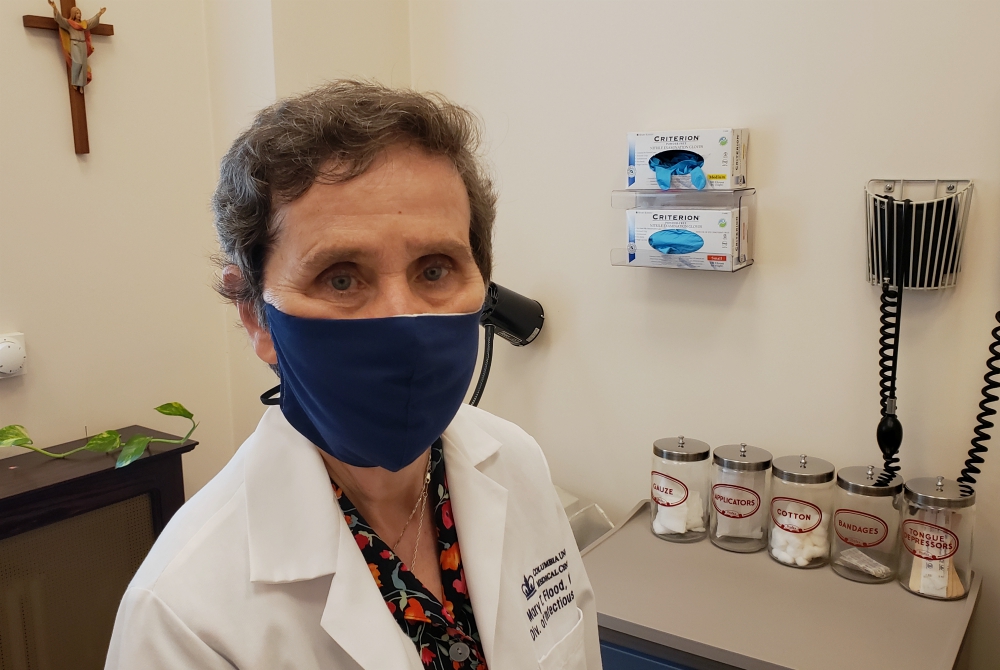
Dominican Sr. Mary Flood in her medical office in Blauvelt, New York. Flood is medical director of the home-care unit for the Sisters of St. Dominic of Blauvelt, New York, and also works as a physician and associate professor of medicine at New York-Presbyterian Hospital, the university hospital of Columbia and Cornell. (GSR photo/Chris Herlinger)
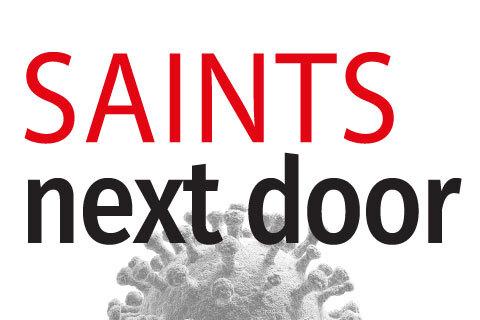
Editor's note: On Holy Thursday, Pope Francis prayed for the dead as well as for the priests, doctors and nurses who he said represented the "saints next door" during the coronavirus pandemic. National Catholic Reporter and Global Sisters Report are telling the stories of Catholics in this crisis: those who have died, but also those whose service brings hope.
As a doctor on the staff of one of New York City's major hospitals, Dominican Sr. Mary Flood brings a quiet efficiency, care to detail and sense of compassion to patients in this coronavirus pandemic, the second health crisis she has faced in her more than 30 years as a physician.
In the 1980s, during the height of the HIV/AIDS crisis and during her early medical career, many of her patients were young gay men.
"It was difficult to see so many young people dying in the early days of the AIDS epidemic. There was so little we could do for them," she said. Her patients were so young they didn't even require cardiograms when they entered the hospital, something routinely done with older patients.
But she never felt any distance between her and them because of the Catholic Church's teaching on sexuality.
"That was never an issue," Flood told Global Sisters Report at an interview at the motherhouse of the Sisters of St. Dominic of Blauvelt, New York, in July. After all, her role was as physician and caregiver.
"All people should be treated with respect and dignity," she said.
New York-Presbyterian Hospital, the university hospital of Columbia and Cornell where Flood is a physician, infectious-disease specialist and associate professor of medicine, cares for patients of all religions and ethnicities.
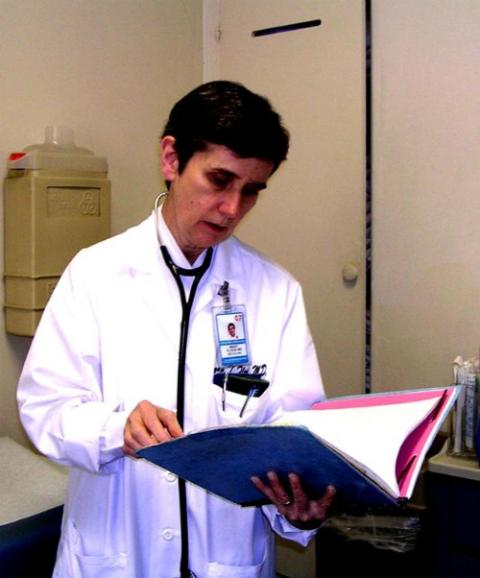
Dominican Sr. Mary Flood in her clinic office in New York City in 2019 (Courtesy of Sr. Mary Flood)
"When you treat people with dignity and respect, people generally recognize your sincerity and appreciate it no matter what your religion," she later wrote in a follow-up email to GSR. "In fact, I think patients expect physicians with a 'religious' background to be compassionate and wanting to help them."
In addition to her work as a physician, Flood balances a number of duties. She is medical director of the home-care unit for the Sisters of St. Dominic in Blauvelt, a small town of about 5,000 in Rockland County, north of New York City. Her office in Blauvelt is a satellite office of Columbia University Irving Medical Center.
Flood works in New York City one day a week and then operates a satellite office in Blauvelt on a second day but says she is "available for patient contact 24/7."
And if that is not enough, she also serves on her congregation's leadership team with the title of councilor.
Even on the days Flood practices medicine, she is involved in congregational leadership.
"It, too, is a 24/7 ministry," she said.
At our in-person interview in July, Flood wore a face mask and was careful to put 6 feet of distance between the two of us as she expressed concern about the coming fall.
"I do worry about a resurgence in this area," Flood, 74, said of the COVID-19 pandemic and the changes it has brought.
This includes the home of her congregation. Social distancing is de rigueur in the chapel. Only two can sit at a table for dinner. In preparation for visitors in the waiting area of her medical office at the congregational motherhouse, Flood carefully places hand-scrawled X's on the chairs.
In the midst of the coronavirus crisis, her experiences with HIV/AIDS are never far away.
"In the 1980s, we had no treatment for HIV/AIDS; patients over time developed multiple opportunistic infections. Some were treatable, but these patients would become increasingly ill and die. When they were hospitalized in their weakened state, the best we could offer was comfort care," Flood said. "Several patients who were critically ill and hospitalized with the COVID virus could only be offered comfort care."
Then and now, the limits of science were an issue. There were no medical solutions to AIDS at first, and that was a challenging, even searing moment, she said.
Advertisement
Advances did come by the mid-1990s, however. Those with HIV can treat the disease with one pill daily, and it is now seen as a "chronic illness rather than a terminal illness," Flood said.
But it remains stubborn, and "we're still far off for developing a vaccine for HIV/AIDS," in part because there is so much variability on the protein coat of the virus, she said.
Flood said both pandemics are confounding, and both challenge science's ability to deal with viruses. So much more is known about HIV, and science is just getting its head around the reality of COVID-19.
"We know how to control HIV, but COVID is really out of control. It's very easily spread," she said. "We don't have a history with it, though we have dealt with other challenging coronaviruses."
But a COVID-19 vaccine can't be rushed, she said: It has to be developed within the prescribed limits of sound and adequate testing.
"You want it to be effective and not be dangerous," she said.
'Always an unusual woman'
Only 30 miles separate the quiet of Blauvelt, located near the majestic Palisade cliffs that overlook the Hudson River, from the bustle of the Bronx, where Flood was born and grew up in a traditional Irish-American Catholic family.
Flood was born Sept. 17, 1946, the third child of John and Kate McHugh Flood. She has two older siblings, sister Margaret and brother James.
As a student at St. Nicholas of Tolentine grammar and high schools, Flood embraced the study of science, biology in particular. She credits teacher Dominican Sr. Mary Ruth Stocks for making those subjects "captivating."
After a year at the College of Mount St. Vincent in the Bronx, Flood, following in Margaret's footsteps, decided to become a Dominican sister and completed her undergraduate degree at Dominican College in Blauvelt, on the same grounds as the convent.
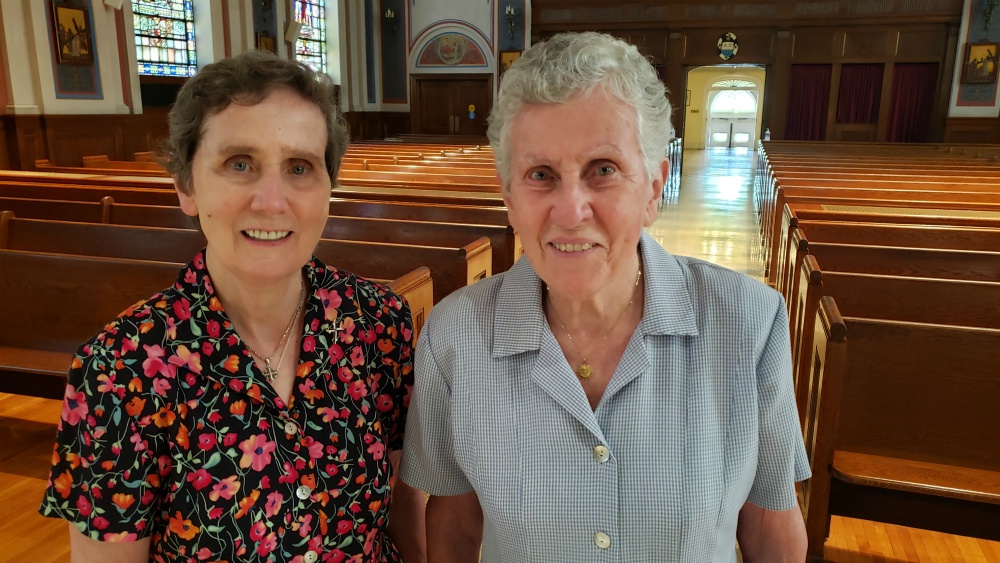
Sr. Mary Flood, left, and her older sister, Sr. Margaret Flood, pose in the chapel of the motherhouse of the Sisters of St. Dominic of Blauvelt, New York. (GSR photo/Chris Herlinger)
In an interview at the Dominican motherhouse, Sr. Margaret Flood, 86, a longtime fundraiser for the congregation who now works as its employee benefits coordinator, recalled that at the time of her sister's decision, she was doing mission work in the West Indies.
Margaret Flood said she was a bit surprised by her sister's announcement. But looking back, she sees the arc of her sister's life and vocation.
"I didn't expect it, but she was always an unusual woman," Margaret Flood said. "She was gifted. She did well in school, and she was always excellent in everything she did."
Margaret Flood, who also works regularly alongside Mary Flood in the congregational medical office doing administrative work, said she admires her sister's ability to balance demanding roles as well as her work ethic.
Mary Flood credits their parents, both Irish immigrants from County Cavan in Ireland who met in New York City, for support and encouragement.
Flood completed her undergraduate work in 1968 and taught at Catholic schools in Blauvelt, Pearl River and Goshen, all in New York state.
But the pull of science never left her, and with the encouragement of her congregation, she pursued a master's degree and then a doctorate in biology at New York University, completing the latter in 1976. Her dissertation was a study of cell cycle times in tumor cell populations.
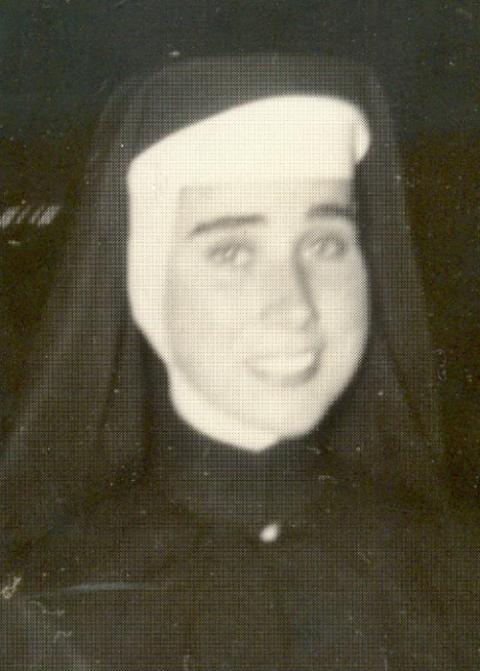
Sr. Mary Flood during her profession of vows as a Sister of St. Dominic of Blauvelt, New York, in June 1966 (Courtesy of Sr. Mary Flood)
For seven years, Flood continued research at the Columbia University Department of Ophthalmology, where she studied genetic diseases of the retina that lead to blindness. But she grew frustrated by the limits of research life, as she could never translate any of her findings into direct care because she "didn't have the proper credentials."
She also missed interaction with people.
So, again with her congregation's permission and with a scholarship from the Conrad N. Hilton Foundation — the major funder for Global Sisters Report — Flood entered the College of Physicians and Surgeons at Columbia University in 1983. Because she lives so close to New York City, she was fortunate, too, to do her residency at the west campus of New York-Presbyterian Hospital in upper Manhattan.
Flood finished Columbia in 1987, at the height of the AIDS epidemic, and it was that medical moment and her interest in helping patients that drew her to primary care and the field of infectious diseases.
She found that her work as a researcher gave her "a deeper insight in understanding the difficulty in working with viruses and in trying to get a treatment or vaccine for HIV/AIDS," she said.
She said her being a Catholic sister is not and has never been a major factor for her colleagues or for her patients.
"My colleagues have always been respectful, but many of them didn't even realize what a sister is," she said. "I was perhaps the first woman religious they met."
Flood said some of her patients thought they were getting "double services."
"I was not there as a chaplain," she said at the interview in Blauvelt, her eyes crinkling with a smile above her face mask. "But if a patient talked about spiritual matters, I was happy to do that."
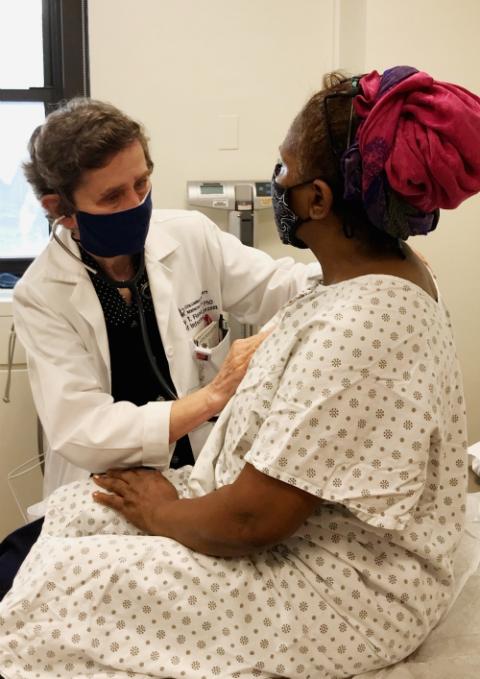
Dominican Sr. Mary Flood, left, attends to a patient at her practice in New York City earlier this year. (Courtesy of the Sisters of St. Dominic of Blauvelt)
She relishes the interaction with patients.
"You have to listen to the patients," she said. "If people are comfortable with you, they will talk."
Flood's approach has garnered attention not only from her patients and colleagues: New York magazine lauded her as one of New York City's "top doctors" in 2014, 2016 and 2017.
Flood said she was pleased with the recognition but "aware of many wonderful doctors who have not been nominated."
Other honors have come her way, too. In 2015, Renew International, a New Jersey-based Catholic ministry and spiritual renewal organization, honored Flood with its President's Award, given to "one whose actions exemplify the Christian value of service."
In accepting the award, Flood said: "It is very humbling to be recognized as someone who helps people encounter God in their everyday life."
'Tireless in her care and concern'
For now, everyday life is about containing the coronavirus.
Flood told GSR in July she is not shy about telling people to stand back or that they're too close.
"That's not social distancing," she will remind other sisters.
Flood was the one who initiated strict protocols at the convent, which in addition to social distancing also meant creating a "quarantine zone" for the nine sisters of Blauvelt's 40 who did become ill with COVID-19. All have recovered.
"She is tireless in her care and concern for our sisters," Sr. Michaela Connolly, the congregation's prioress, told GSR in an email.
Margaret Flood said her sister's role as guardian of pandemic protocols is greatly appreciated among the sisters.
"She's had a lot of foresight about policies that needed to be put in place," Margaret Flood said. "Mary is always present for the sisters who have needs here."
In the midst of so much uncertainty, Connolly said in her email that the congregation is fortunate to have Flood in "a unique position" to live out the Dominican charism "to preach truth through our care and advocacy on behalf of the poor and marginalized."
"Her medical ministry has allowed her to serve those who are marginalized by society not only in New York City, but in the Third World as well," Connolly said, noting Flood's short-term work in HIV/AIDS education in South Africa and her medical mission to the Dominican Republic. "She truly exemplifies our Dominican call to preach the Gospel to all people."
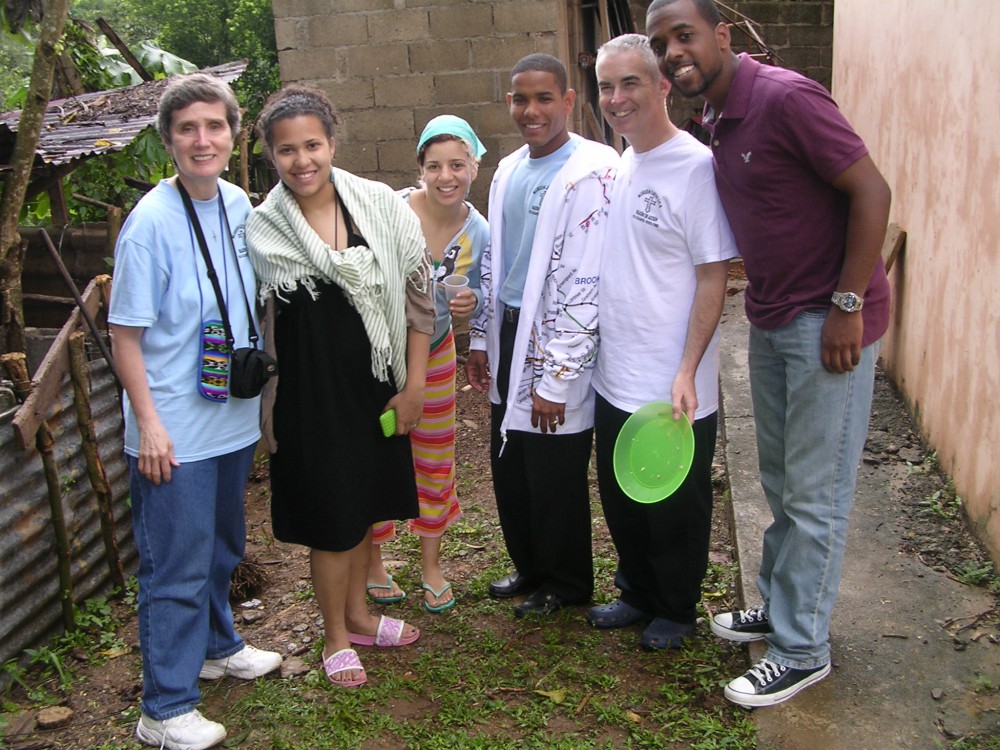
Sr. Mary Flood, left, and medical colleagues during a medical mission to the Dominican Republic in July 2009 (Courtesy of Sr. Mary Flood)
The congregation, Connolly added, has been blessed by "Sr. Mary's presence among us all through her years as one of us, but especially during this time of pandemic."
"She has been a support and comfort to all of us as we adjusted protocols at the motherhouse to deal with the virus," Connolly said. "Nothing is too much for her."
For the moment, Flood and everyone else will be dealing with the "new normal" of precautions, vigilance and care.
Which takes her back to the concerns about the fall, with the beginning of flu season. Flood tells everyone to get a flu shot, but she worries that the possible confluence of COVID-19 and the flu could make for a troubling fall and winter.
But as she did during the AIDS crisis, Flood will continue to care for those in need, keeping in mind a remark made by a Jesuit priest on a directed retreat that encapsulates her own life as a sister and a physician.
"He told me that Jesus was a healer," she said. "And if Jesus were around today, he'd be a science researcher or a physician."
[Chris Herlinger is GSR New York and international correspondent. His email address is [email protected].]





